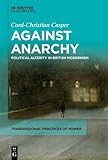Against Anarchy : Political Alterity in Early Modernism / Cord-Christian Casper.
Material type: TextSeries: Transregional Practices of Power ; 1Publisher: München ; Wien : De Gruyter Oldenbourg, [2020]Copyright date: ©2020Description: 1 online resource (VI, 660 p.)Content type:
TextSeries: Transregional Practices of Power ; 1Publisher: München ; Wien : De Gruyter Oldenbourg, [2020]Copyright date: ©2020Description: 1 online resource (VI, 660 p.)Content type: - 9783110644654
- 9783110646443
- 9783110645873
- online - DeGruyter
- Issued also in print.
| Item type | Current library | Call number | URL | Status | Notes | Barcode | |
|---|---|---|---|---|---|---|---|
 eBook
eBook
|
Biblioteca "Angelicum" Pont. Univ. S.Tommaso d'Aquino Nuvola online | online - DeGruyter (Browse shelf(Opens below)) | Online access | Not for loan (Accesso limitato) | Accesso per gli utenti autorizzati / Access for authorized users | (dgr)9783110645873 |
Frontmatter -- Contents -- 1. Introduction -- 2. Political Literature and the Demarcation of Alterity -- 3. Demarcations of Culture and Anarchy in The Princess Casamassima -- 4. Residual Politics in The Secret Agent -- 5. Politics beyond Demarcation? Loss of Alterity in Conrad and Chesterton -- 6. Conclusion -- Sources -- Acknowledgments -- Index
restricted access online access with authorization star
http://purl.org/coar/access_right/c_16ec
'Against Anarchy' investigates the function of Anarchism in Early Modernist political fiction. The study explains how political novels from 1886 to 1911 narrate and evaluate the function of Anarchists as embodiments of a radical space beyond politics.The literary prevalence of Anarchists has so far not been connected systematically to its literary and political functions. The study addresses this research gap in detailed analyses of a radical theme in narratives by Joseph Conrad, Henry James, and G.K. Chesterton. It shows that each novel presents strategies of demarcation that allow turn-of-the-century Britain to project its cultural anxieties upon an imagined other, the dreaded figure labelled ‘Anarchist’. The political radical is set up as the foil against which comforting self-descriptions can be maintained. Rather than merely reproducing this boundary work, however, the novels also evaluate its function, both for the respective political system and for their own narrative capabilities — and present the consequences incurred by the loss of an anarchist outside.'Against Anarchy' is a thorough cultural historiography of the politically other and marginal. At the same time, the study demonstrates that close attention to the specific literary image of Anarchism allows for a re-evaluation of political thought beyond its immediate historical moment — a literary political theory in its own right.
Issued also in print.
Mode of access: Internet via World Wide Web.
In English.
Description based on online resource; title from PDF title page (publisher's Web site, viewed 28. Feb 2023)


